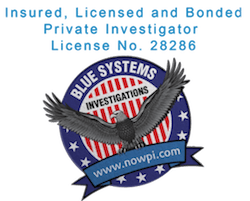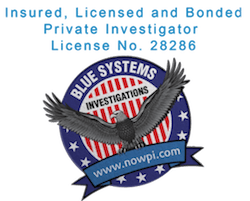Latest Blog Posts
August 15, 2019
August 15, 2019
August 15, 2019
Follow us on Facebook
Certification
CA Private Investigator
License No. 28286
PI Services
Locations Served
Client Intake Forms
How Background Checks Work: A Step-by-Step Explanation
Why Background Checks Matter
Background checks involve several critical levels of verification. Whether you're making employment decisions, evaluating business partnerships, or addressing personal concerns, fully understanding someone's history before placing your trust in them provides essential peace of mind. Failing to conduct proper due diligence through comprehensive background checks can expose you to significant risks if you allow untrustworthy individuals into your organization or home.
Pre-employment screening has become standard practice for businesses of all sizes, with over 96% of employers now conducting some form of background verification. As workplace safety concerns and liability issues continue to rise, background checks have transformed from optional to necessary.
Background checks also prove invaluable in personal situations. For example, they're crucial when checking the identity and history of your ex-spouse's new partner. You cannot afford to entrust your children's welfare to someone you don't fully know. A thorough background investigation provides critical information during child support and custody proceedings.
Section 1: The Background Check Process
Understanding how background checks work requires familiarity with the typical workflow. While specific procedures vary based on industry requirements and organizational policies, most background checks follow these essential steps:
Step 1: Obtaining Proper Authorization
Before initiating any background check, written authorization must be secured from the individual being investigated. This requirement isn't just good practice—it's mandated by the Fair Credit Reporting Act (FCRA) and various state regulations. The authorization forms must clearly explain:
- What specific information will be collected
- How this information will be used in decision-making
- Which verification service or agency will conduct the check
- The individual's rights under applicable laws
Without securing proper consent, organizations risk substantial legal penalties, including potential class-action lawsuits for non-compliance.
Step 2: Selecting the Appropriate Background Check Level
Different situations require different levels of scrutiny. Most reputable investigation services offer tiered background check options:
Tier 1: Basic Pre-employment Screening
- Age and year of birth verification
- County-level criminal court records search
- County-level civil court records search
- Educational credential verification
- Employment history confirmation
- Social Security number validation
Tier 2: Comprehensive Background Investigation
- All Tier 1 elements
- Residential history with dates of occupancy
- Bankruptcy, foreclosure, and lien searches
- Family background examination
- Alias and identity fraud screening
- Municipal civil case involvement
- Statewide felony conviction searches
- Statewide civil litigation searches
Tier 3: Extensive Background Investigation
- All Tier 1 and Tier 2 elements
- Military service verification
- Business affiliations and income sources
- Interviews with professional references
- Detailed bankruptcy and tax lien specifics
- Verification through confidential sources
Selecting the appropriate tier depends on the position's sensitivity, level of trust required, and potential risk factors.
Step 3: Information Collection and Verification
Once authorization is secured and the appropriate level selected, the actual investigation begins. This process involves:
Identity Verification The foundation of any background check starts with confirming the individual is who they claim to be. This typically includes:
- Full legal name verification
- Social Security number validation
- Date of birth confirmation
- Address history validation
Criminal History Research Criminal record searches may include:
- County courthouse records (typically covering 7+ years)
- State criminal databases
- Federal criminal records
- Sex offender registries
- Global watchlists for security-sensitive positions
Employment and Education Verification This critical component confirms the accuracy of claimed credentials:
- Direct contact with previous employers
- Verification of employment dates, positions, and reasons for departure
- Confirmation of degrees, diplomas, and certifications
- Validation of professional licenses
Financial Background Assessment For positions involving financial responsibilities:
- Credit history review
- Bankruptcy records search
- Tax lien examination
- Judgment and collection account identification
- Asset and liability evaluation
Step 4: Results Compilation and Analysis
As information is gathered and verified, findings are compiled into a comprehensive report. This report must adhere to strict formatting and content requirements under applicable regulations.
A professional background check report typically includes:
- Executive summary highlighting key findings
- Detailed records for each verification component
- Documentation of any discrepancies or inconsistencies
- Red flag indicators requiring additional attention
- Source citations for all information provided
Step 5: Decision-Making Based on Findings
Upon receiving the completed report, decision-makers review the findings according to established criteria. If all information is confirmed and no issues are identified, the process typically proceeds as planned.
However, if potentially adverse information appears, specific procedures must be followed:
- Provision of pre-adverse action notice with report copy
- Inclusion of FCRA Summary of Rights
- Reasonable time allowance for dispute resolution
- Final decision notification if warranted
This regulated process ensures individuals have an opportunity to address any errors or provide context for negative information before final decisions are made.
Section 2: Types of Information Verified
The scope of a background check varies widely depending on the position, industry requirements, and organizational policy. Understanding what information can be accessed helps both parties navigate the process effectively.
Criminal History Records
Criminal background checks represent the most common component of pre-employment screening, searching for:
- Felony convictions (typically with no time limitation in most jurisdictions)
- Misdemeanor convictions (often limited to 7-10 years)
- Sex offender registry listings
- Terrorist watchlist screens
- Pending criminal cases in some jurisdictions
It's important to understand that arrest records without convictions face restrictions in many locations, and numerous states have enacted "ban-the-box" laws limiting when in the hiring process criminal history can be considered.
Employment History Verification
Employment verification confirms the accuracy of previous work experience:
- Organizations listed on applications
- Employment dates (start and end dates)
- Positions and responsibilities held
- Reasons for departure (though many employers limit this information)
- Eligibility for rehire status
Most employment verifications cover 5-7 years of history, though more extensive checks may examine longer periods for executive positions or security-sensitive roles.
Education Credentials Verification
Education verification confirms academic claims:
- Degrees, diplomas, and certifications earned
- Attendance dates and graduation status
- Fields of study and specializations
- Academic standing when relevant
This verification addresses the approximately 30% of applications containing educational discrepancies according to industry studies.
Professional License Verification
For positions requiring professional licensing:
- License type and registration number
- Issuing authority and jurisdiction
- Current status (active, expired, suspended)
- Issuance and expiration dates
- Any disciplinary actions or practice restrictions
Financial Background
Credit checks examine financial history for relevant positions:
- Outstanding debt obligations
- Payment history patterns
- Bankruptcy filings and collections
- Public records related to financial matters
- Credit utilization and management
Many states have enacted laws restricting credit information use in hiring decisions, and such checks should only be conducted when directly relevant to position requirements.
Section 3: Timeline Expectations
Understanding how long background checks take helps establish realistic expectations for all parties involved.
Factors Affecting Background Check Duration
Several key factors influence processing timelines:
- Investigation scope: More comprehensive checks require additional time
- Geographic considerations: International verifications involve extended timeframes
- Court access limitations: Some jurisdictions have restricted access, requiring in-person searches
- Verification source responsiveness: Educational institutions and employers vary significantly
- Information accuracy: Incomplete or incorrect data causes substantial delays
- Seasonal variations: High-volume hiring periods may extend turnaround times
Average Timeframes by Check Type
While processing times vary based on circumstances, typical turnaround expectations include:
- Basic identity verification: 1-2 business days
- Criminal record checks: 1-3 business days for domestic searches
- Employment verification: 2-3 business days per employer
- Education verification: 1-3 business days per institution
- Professional license verification: 1-2 business days
- Credit history examination: Same day to 24 hours
- Motor vehicle records: 1-3 business days
Standard pre-employment background checks typically require 3-5 business days from start to finish. More comprehensive executive-level screenings or investigations involving international components may extend to 7-10 business days or longer.
Avoiding Unnecessary Delays
To ensure efficient processing:
- Provide complete legal names, including middle names or suffixes
- Supply accurate dates of employment and education
- Include current contact information for all references
- Disclose any name variations or previous identities
- Address potential issues proactively rather than reactively
Section 4: Legal Considerations and Compliance
Background checks operate within a complex legal framework designed to balance information needs with privacy rights and civil protections.
FCRA Requirements for Employers
The Fair Credit Reporting Act establishes the primary federal regulations:
- Clear, standalone disclosure before conducting checks
- Written authorization from the individual
- Strict adverse action procedures when negative information affects decisions
- Proper information disposal requirements
- Compliant consumer reporting agency selection
Failure to follow FCRA requirements can result in penalties up to $1,000 per violation in individual cases—and potentially millions in class-action lawsuits.
Ban-the-Box Legislation Impact
Over 35 states and 150 municipalities have enacted some form of ban-the-box or fair chance hiring laws that:
- Prohibit criminal history questions on initial applications
- Delay background checks until later in selection processes
- Require individualized assessment of criminal records
- Mandate consideration of rehabilitation efforts and time elapsed
Organizations operating across multiple jurisdictions must navigate this regulatory patchwork carefully.
State-Specific Regulations
Beyond federal requirements, many states impose additional restrictions:
- California: Limits checks to seven years and restricts expunged record use
- Massachusetts: Prohibits questions about certain misdemeanors older than five years
- New York: Requires consideration of specific factors before rejection based on criminal history
- Illinois: Restricts credit information use in employment decisions
- Washington: Mandates direct relevance between criminal records and specific positions
Multi-jurisdiction employers typically adopt policies aligned with the most restrictive applicable laws or create location-specific procedures.
Why Choose Professional Background Check Services
Even other investigative agencies frequently refer clients to specialized background check providers. Here's why working with experienced professionals matters:
Licensing and Credentials
Reputable background check services maintain appropriate licensing in their operating jurisdictions. You can verify license status through state regulatory agencies. A professional investigation service will provide their license number immediately upon request.
Experience That Fits Your Requirements
The most qualified services employ investigators with specialized expertise matching your specific needs. Their teams understand how to blend seamlessly into different environments rather than drawing unwanted attention during sensitive inquiries.
Professional Liability Protection
Established background check providers maintain comprehensive insurance coverage for any property damage or liability concerns that might arise during investigations. This protection safeguards all parties throughout the process.
Client-Centered Approach
Professional background check services prioritize client communication. They listen carefully to specific needs and expectations from the initial consultation through final reporting. Their investigators are trained to provide clear explanations, address concerns promptly, and maintain confidentiality at all times.
Conclusion
Background checks have evolved from optional to essential in today's risk-conscious environment. When properly conducted, they provide invaluable information for making informed decisions while protecting individual rights and maintaining regulatory compliance.
The most effective background screening programs balance thoroughness with efficiency, employing risk-based approaches that scale verification depth according to position requirements. By understanding how background checks work—from initial authorization through final decision-making—all parties can navigate the process more effectively.
For organizations seeking to implement or improve background screening processes, working with reputable providers who prioritize compliance, accuracy, and experience is essential. As regulations continue to evolve and technology transforms investigative methods, staying informed about emerging best practices remains critical for maintaining effective, compliant verification procedures.
Resources for Further Information
- Equal Employment Opportunity Commission Background Check Guidance
- Consumer Financial Protection Bureau Resources
- Society for Human Resource Management Best Practices
- Professional Background Screening Association










